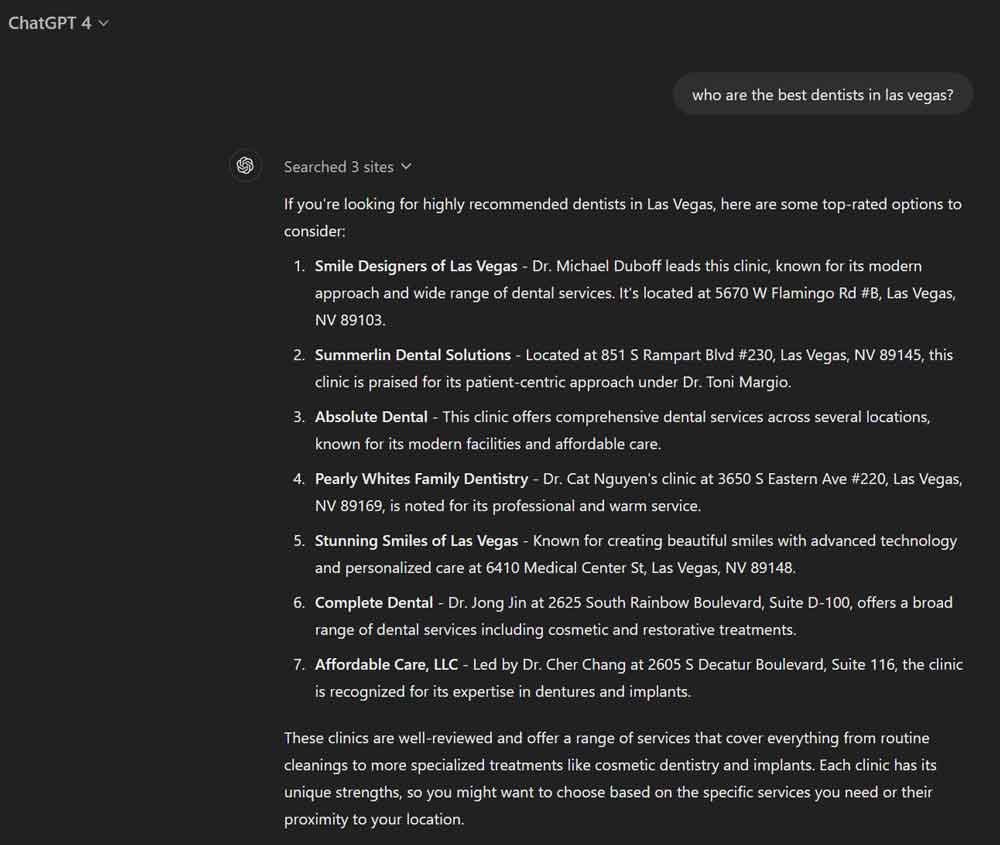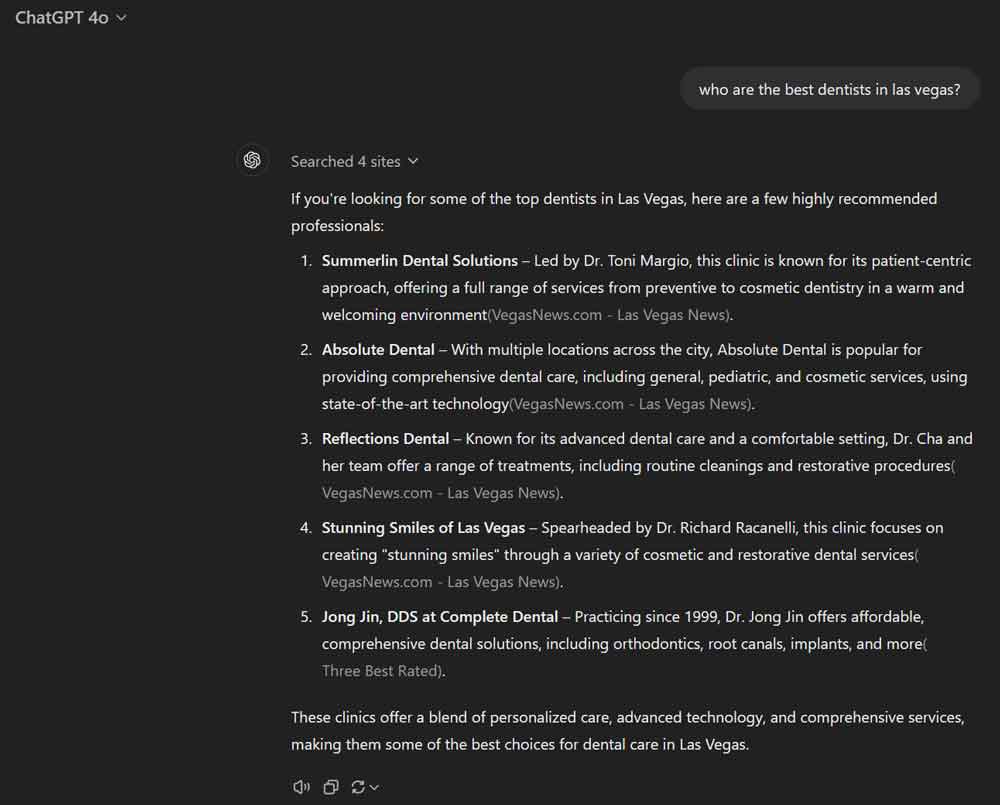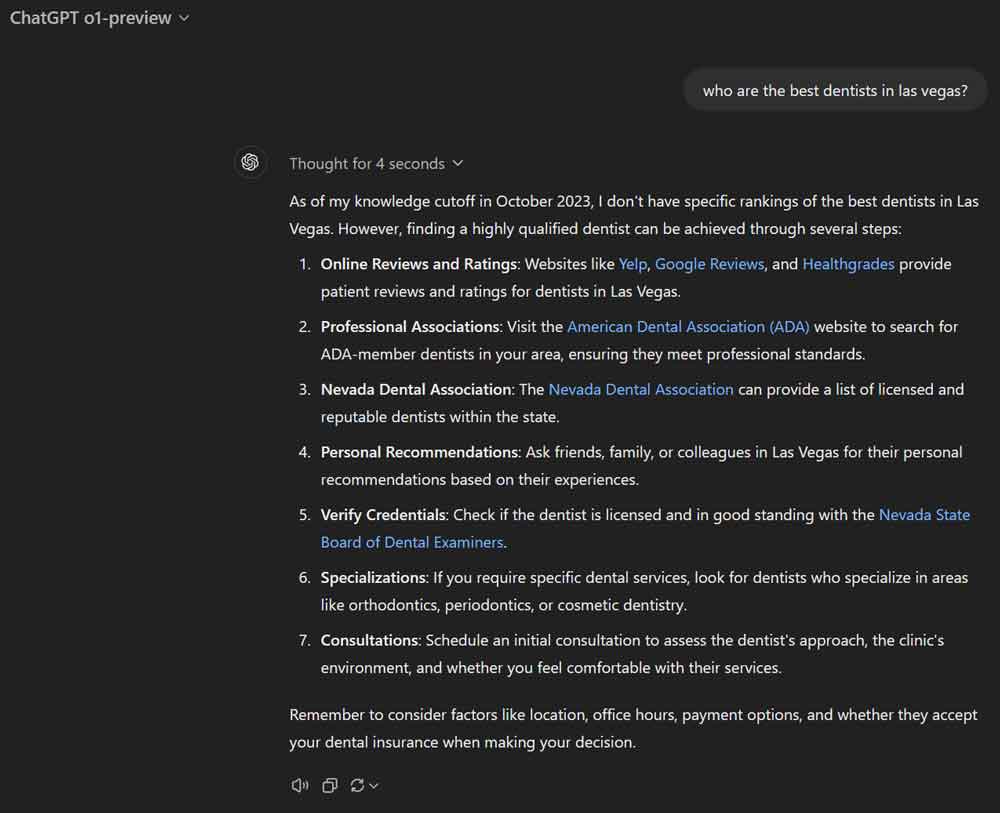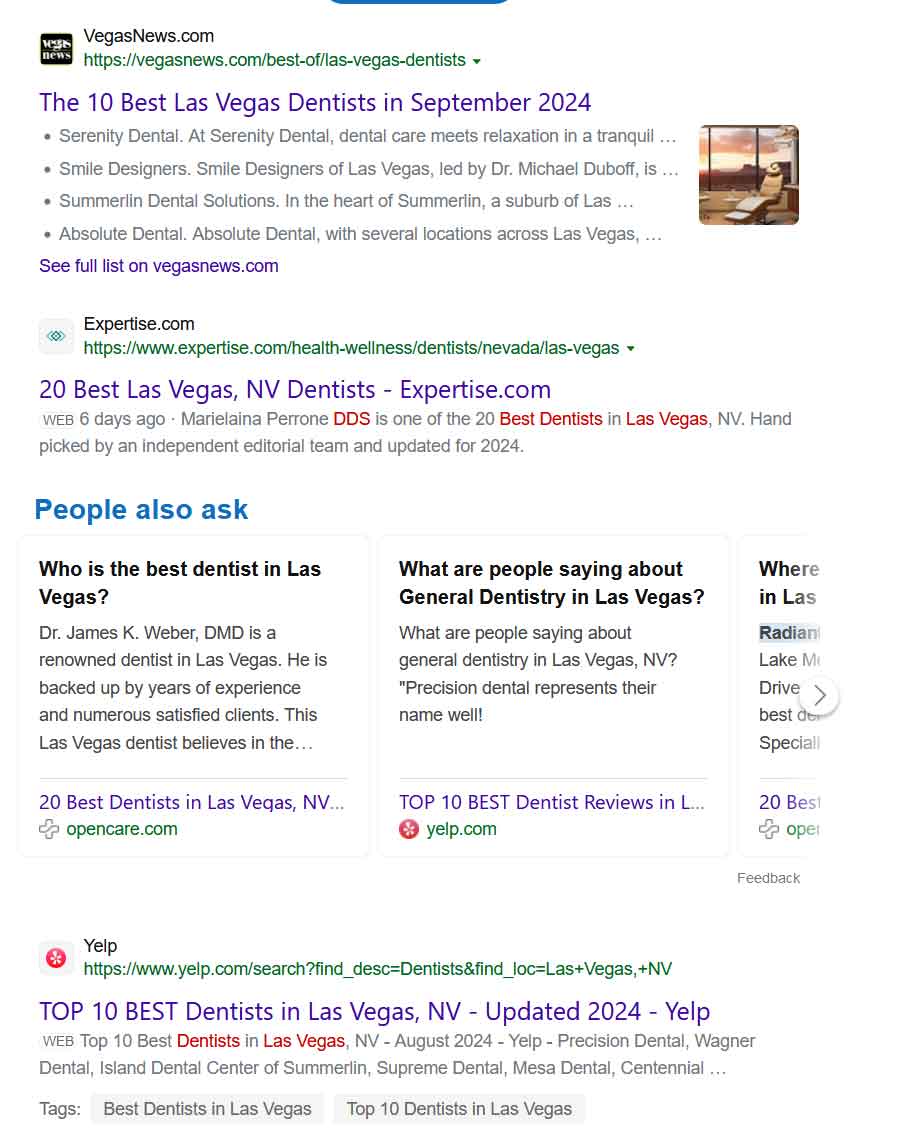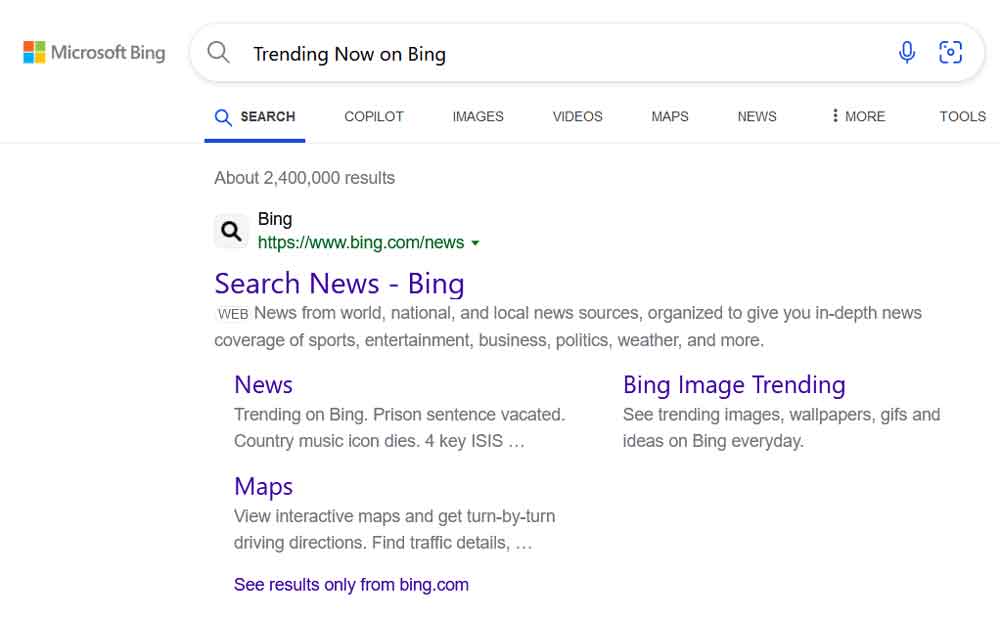According to OpenAI, ChatGPT has more than 200+ million active weekly users, which equates to about 800 million to 1 billion active users per month. With SearchGPT around the corner and ChatGPT already having web-browsing capabilities, it’s becoming more important now than ever for businesses to consider how to rank in AI-based chat systems.
Table of Contents
While SearchGPT, the AI-based structured search engine, is still an early prototype (as of Sept 15th, 2024), ChatGPT already had web-browsing capabilities for a while now that allows it to provide suggestions from the web as well as from sites it deems as authoritative sources.
After shifting through a detailed experiment on how ChatGPT recommends and rankings businesses/websites, we classified the top 10 things that you can do today to best optimize your business for ChatGPT (and SearchGPT in the future).
OpenAI Search Results Models Comparison
To optimize your business for ChatGPT, focusing on top ranking factors and knowing what those are will help agencies improve client’s standings and help businesses improve their visibility in the next generation of search.
Within OpenAI’s product line, there are several ways in which an AI model can recommend a business. While we will focus on mainly ChatGPT, here’s a chart to help explain the differences in search results from each model.
| ChatGPT-4 | ChatGPT-4o | ChatGPT-o1 Preview | SearchGPT | |
| Last Trained Knowledge | Dec 2023 | Oct 2023 | Oct 2023 | ??? |
| Web-browsing Capabilities | Yes | Yes | No | Yes |
| Results Format | Descriptive List | Descriptive List | Descriptive List | Structured Rich Media |
| Reference Sources | Only in Searched Sites | Searched Sites + Response | Sometimes in Response | Yes |
| Rich Media Extraction | No | No | No | Yes |
| Search Replacement | No | No | No | Yes |
| Search Engine | Bing | Bing | None | OAI-Search |
- ChatGPT-4: Now considered a older, “more models”, option in ChatGPT, ChatGPT-4 is still available as an AI engine. It benefits from having the newest training knowledge while still retaining web-browsing capabilities. However, we found the format to be a bit dated as it doesn’t provide reference sources by default, unless specifically prompted to do so. Reference sources can only be found in the “Searched sites” dropdown.
- ChatGPT-4o: The current mainstream model in ChatGPT (as of 9/15/2024). ChatGPT-4o provides sources in both “Searched sites” and in the response itself without additional prompting. It also has the same web-browsing capabilities as ChatGPT-4.
- ChatGPT-o1 Preview: Still in Preview mode (as of 9/15/2024), ChatGPT-o1 provides additional reasoning capabilities; however, it disappointing that it doesn’t have search capabilities. However, it does at times provide reference links to sources in results that are a part of its training set.
- SearchGPT: An early prototype (as of 9/15/2024), SearchGPT was designed to be a direct competitor to Google and other search engines. As a search replacement, SearchGPT provides rich media (text,photos,videos) in results while structuring output in snippets and sources. While we are not too certain as to the age of its training data, it’s also less relevant, since SearchGPT always relies on search results from its own OAI-Search engine (likely still a Bing-based search engine).
ChatGPT Rankings: Minimum Requirements
We can deduce from the model comparison that a business needs to meet one of two requirements in order to ranking in ChatGPT:
- Training Data: Being a part of the content used to train OpenAi’s generative AI, such as through GPTBot, allows the content from the website to potentially be brought up in responses. Training data can also influence web-search (below) simply by “already knowing” the business or source from its own training data.
- Web-Search Determinate: Generally, when a model with web-browsing capabilities is presented with search results (such as from Bing) and other authoritative sources, the results from these sources take precedence, What’s interesting is that ChatGPT not only looks at presenting information from snippets in the search results, it also “reads” the content of the results to further distill information that might help answer the query. Furthermore, SearchGPT uses a dedicated OAI-SearchBot to crawl and index websites, which is separate from the way ChatGPT uses Bing to provide search results.
Based on our tests and experiments, below are the top 10 ranking factors that matter to ChatGPT (and will likely still apply to SearchGPT in the future).
1. Relevance of Titles
Titles work as not just hooks but also crucial signposts guiding users directly to what they seek. For ChatGPT rankings, this principle holds significant weight when classifying the website since it is still based on Bing search results.
A title that’s closely aligned with search queries will naturally perform better because it promises relevance—answering questions or solving problems right off the bat, especially with existing ChatGPT Bing search results. Thus, investing time into crafting descriptive yet concise titles pays immense dividends by boosting visibility and enhancing user engagement rates significantly—an absolute necessity in optimizing content performance within ChatGPT’s frameworks.
2. Industry Authority and Credibility
When assessing authority and credibility for ChatGPT’s ranking factors, focus on the source’s branding and visibility, which usually means you’re dealing with a more reputable site. This aspect is crucial since sites with strong reputations have earned trust over time by consistently providing accurate and valuable information.
For instance, when looking at tech reviews, the AI will opt for sources recognized for their specialization in technology. Reputable magazines like Techcrunch.com or PCMag.com stand out due to their longstanding dedication to thorough testing methods and expert analysis. Selecting information from these types of sites not only enhances your content’s reliability but also signals search engines that you prioritize quality resources.
In essence, aligning your work with high reputation sites known for their expertise conveys confidence in your own content’s value. It tells readers—and algorithms—that what they’re engaging with comes from a place of knowledge and authoritative research.
3. Content Quality and Depth
In crafting content that ranks well on ChatGPT, diving deep into your topic is an absolute must. Develop content sources that incorporate a high degree of thoroughness—those offering in-depth reviews and exhaustive specifications alongside hard-to-ignore performance metrics. This approach not only boosts the depth of your article but also its attractiveness to both AI algorithms and human readers seeking substantive information.
Furthermore, never overlook the importance of expert authorship. Content penned or thoroughly vetted by acknowledged authorities carries more weight. It signals to search engines—and by extension, to ChatGPT—that what you’re presenting isn’t just another piece of fluff content but a carefully considered exploration informed by genuine expertise.
4. Cross-Reference Information
With ChatGPT and its ranking factors, don’t overlook the power of cross-referencing information, meaning where the AI can find the business mentioned more than once. It’s no longer about show up in a top position in search, the AI may consider one or two different sources before deciding on a response. To truly stand out and build trust, make sure to have placements, recommendations, or reviews from various reputable sites.
Let’s say you’re discussing top HDTV models. If the AI finds RTINGS.com, PCMag, and Digital Trends all rave about the same models, that’s a green flag! It subtly tells the AI these recommendations are solid because they’re consistently praised across respected platforms.
This approach doesn’t just beef up credibility; it demonstrates thoroughness in visibility which ChatGPT loves. So next time consider where you pen an article or evaluate a business because cross-reference is key—it adds layers to your content making it robust and trustworthy in everyone’s eyes.
5. Bing Search Engine Optimization
When optimizing for Bing, we understand how to optimize for specific keywords. In this case, we want to optimize keywords for ChatGPT, similar to how we optimize for SEO. The key is understanding what phrases ChatGPT is likely to produce to come up with search results.
For a dental practice aiming high in 2024 Las Vegas searches, phrases like “top dentists in Las Vegas 2024” and “highly rated dentists Las Vegas” should be on your radar. These are what ChatGPT types into Bing when looking for services. But there’s more than just choosing the right words.
Boolean operators play a crucial role here too. They refine your results sharply, making it easier for Bing to understand exactly what you’re after with combinations like (“top dentists” AND “Las Vegas” AND “2024”). This clarity not only boosts visibility but ensures that traffic driving towards your site is as relevant as can be – individuals actually seeking top-notch dental care in Las Vegas within that year.
Factors that associate with SEO for Bing also matter here for ChatGPT, including backlinks, on-page optimizations, off-page optimizations, website authority, and many others. This is likely still remain true for SearchGPT since OpenAI’s goal is to merge features from SearchGPT into ChatGPT in the future.
6. Domain Authority (DA) and Page Authority (PA)
For SEO, understanding Domain Authority (DA) and Page Authority (PA) is crucial, but now it’s also important for ChatGPT. Using tools like Moz Link Explorer or Ahref.com can help us grasp their values for websites and specific pages respectively.
For example, DA scores come from entering a domain URL into Moz’s tool. This score reflects the overall strength and trustworthiness of a website on a scale from 1 to 100. Higher numbers suggest more robust sites likely to rank well in search engine results.
For PA, we focus on individual pages rather than whole domains by checking their scores through the same process. A page with high PA is deemed strong within its own rights which hints at better chances of ranking favorably for relevant queries. Take Vegas News as an instance: it has a commendable DA at 56 alongside its PA standing at 48 indicating both site-wide reliability and page-specific authority that Bing tends to reward with higher visibility in search outcomes.
7. Unique Insights
Understanding unique insights is key to boosting your ChatGPT content in rankings. Let’s dive into why this matters. When creating content, blending diverse sources enriches it significantly.
For example, one article excels at breaking down gaming features while another shines by analyzing HDR performance meticulously. By combining these perspectives, your content becomes a connector of information that stands out.
Now imagine you’re crafting an article on the latest gaming consoles.
You find a piece detailing exclusive game titles and another focusing solely on console hardware specs like HDR capabilities. Merging these insights not only provides readers with comprehensive knowledge but also showcases your ability to present well-rounded views. Such depth signal that your content isn’t just rehashed material but offers something valuable and unique – exactly what algorithms favor when deciding which pages get top billing.
Remember, it’s not about quantity but the quality of integrated information from varied sources that makes for stellar ChatGPT-friendly articles capable of climbing up those rankings efficiently.
8. User Reviews and Feedback
User reviews and feedback are critical when you’re aiming to enhance the performance of your ChatGPT or any tool for that matter. They give you a glimpse into how real users interact with the technology, highlighting strengths and areas needing improvement. Tools like sentiment analysis can break down this massive amount of data, pinpointing what makes users happy or frustrated.
It’s essential to dive deep into websites dedicated to compiling user ratings and reviews. More specifically, focus on ratings sites that are specific for a niche, such as opencare.com for when looking up Dentists.
When selecting which insights to focus on, aim for diversity in perspectives. This approach ensures that recommendations cater not just to those at one end of the economic spectrum but offer valuable information across various price points – from budget-friendly options all the way up through high-end choices.
Remember, genuine improvements stem from understanding these diverse experiences intricately linked with your product’s day-to-day use in real-world scenarios. Leveraging user feedback smartly positions your ChatGPT project well ahead in its journey towards excellence.
9. Top Recommendation Lists
To boost your ranking and land on top recommendation lists, focus on crafting a natural link profile. Google prizes authenticity over engineered strategies. Avoid excessive reciprocal links; it’s clear that swapping too many can harm more than help.
Instead of chasing shortcuts, foster genuine connections with reputable sites for backlinks. Remember the value in user-generated content (UGC) but be discerning about its source. A link from a well-known blog holds far more weight than countless links from lesser-known or ‘fake’ blogs.
ChatGPT will be even more discerning than Google at distinguishing between valuable UGC and those not worth their digital ink. Also noteworthy is how you manage outbound links on your pages—keep them relevant and to a point without overwhelming visitors or diluting your own message.
By adhering closely to these guidelines—not only do you stand better chances in rankings but also ensure sustainability amidst future algorithms changes.
10. Relevance of Snippets
Understanding the relevance of snippets is key in optimizing your content for ChatGPT. Snippets, those short descriptions search engines show under each website link, are crucial. They give a sneak peek into your site’s content directly from the search results page.
Now, why does this matter? Well, it influences whether users click on your link or not, and also how ChatGPT reads those snippets. Here’s what you need to do: craft snippets that capture detailed and relevant information tailored to specific queries.
This means using precise language that answers potential questions upfront. But there’s more—these snippets must also be engaging enough to stand out among competitors’ listings. Remember, when people look at search results, their eyes first go to these brief texts before deciding which site might have the exact info they seek—or seem intriguing enough for a visit anyway.
By focusing on enhancing snippet quality with specificity and relevancy—you’re not just aiming for clicks; you’re working towards providing value right from the get-go. So think of every snippet as an elevator pitch for its respective web page- make every word count!


